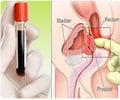The oral drug olaparib was found to be effective against advanced pancreatic and prostate cancers.

"Our results show that the BRCA1 or BRCA2 genes inherited by some patients can actually be the Achilles heel in a novel, personalized approach to treat any type of cancer the patient has," says the study's senior author, Susan Domchek, MD, director of Penn's Basser Research Center for BRCA, the nation's only center devoted solely to research for prevention and treatment associated with BRCA mutations. "As many as 3 percent of patients with pancreatic and prostate cancer have an inherited mutation in BRCA1 or BRCA2. Our findings have implications for many patients beyond those with breast and ovarian cancer."
Five of 23 pancreatic cancer patients (22 percent) and four of eight prostate cancer patients (50 percent) responded to the therapy, as measured by objective clinical criteria. Importantly, the therapy also appeared to halt disease progression even in those whose tumors did not shrink: an additional eight (35 percent) of the pancreatic cancer patients studied had stable disease at 8 weeks after beginning olaparib, as did two (25 percent) of the prostate patients. Overall survival at one year was 41 percent for the pancreatic cancer patients, and 50 percent for the prostate cancer patients.
For patients with breast and ovarian cancer, the study confirmed the previously reported activity of olaparib, although tumors treated in this study were much more advanced than in prior studies. For example, in 193 patients with ovarian cancer in whom cisplatin was no longer effective for controlling advanced disease, 31 percent had partial or complete tumor regression on olaparib, and 64 percent were alive at one year. Among 62 patients with metastatic breast cancer patients who had already received at least three chemotherapy regimens, 13 percent responded to new therapy and 45 percent of patients were alive at one year.
The authors found that treatment with olaparib is very well-tolerated. The most commonly reported side effects were mild to moderate fatigue and nausea (each experienced by 59 percent of patients), and transient episodes of vomiting (37 percent). Seventeen percent of patients experienced anemia, and four percent of patients suffered side effects that led to discontinuation of therapy.
As of January 2013, 33 patients remained on the study.
The results will be presented by lead author Bella Kaufman, MD, from Sheba Medical Center in Tel Hashomer, Israel, in the Tumor Biology poster session from 8 a.m. to noon on Monday, June 3, 2013 in S102 McCormick Place.
 MEDINDIA
MEDINDIA
![Prostate Specific Antigen [PSA] & Prostate Cancer Diagnosis Prostate Specific Antigen [PSA] & Prostate Cancer Diagnosis](https://images.medindia.net/patientinfo/120_100/prostate-specific-antigen.jpg)


 Email
Email










